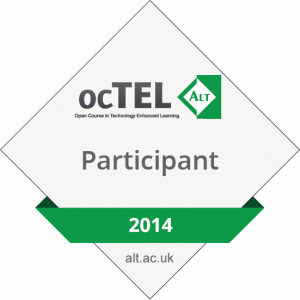-
Maren Deepwell wrote a new post, The open course you cannot fail…, on the site ocTEL 2014 11 years, 7 months ago
… unless you fail to find something interesting.
 Welcome to the second run of ocTEL, the Open Course in Technology Enhanced Learning. Last year we ran the course[1], designed, written and supported by members of ALT, for the first time and 1200+ people registered. Within the first few days, hundreds of participants interacted with the course and its fledgling community in some way. Then, different patterns of engagement began to emerge from those where were actively completing activities to those joining live sessions, posting in forums, blogging, tweeting or lurking.
Welcome to the second run of ocTEL, the Open Course in Technology Enhanced Learning. Last year we ran the course[1], designed, written and supported by members of ALT, for the first time and 1200+ people registered. Within the first few days, hundreds of participants interacted with the course and its fledgling community in some way. Then, different patterns of engagement began to emerge from those where were actively completing activities to those joining live sessions, posting in forums, blogging, tweeting or lurking.
So this time round, with a slightly shorter course, and a focus beyond teaching in Higher Education, how do we hope participation in the course will happen? The answer is simple: you cannot fail the course or fail to complete it. You might ask, why is that and how does it work then? Here are our thoughts on how you can make ocTEL work for you:Participating
The course has an introduction week and 6 week-long modules (with a break in the middle). While you can participate from the first day to the last, there is no expectation that you do so. Modules, activities and live sessions don’t require you to have completed any of the previous ones, leaving you free to pick what’s most relevant to you, your role and your context. Each week there will be a “if you only do one thing” section, highlighting what we have chosen as a key activity. There will also be core activities, resources and a live session – and there is a new TEL explorer section for those of us who want to find out more about a particular topic.
Here is a list of the content of the course:Week 0: TEL & the future (induction) – 28 Apr 2014
Week 1: Concepts and approaches – 5 May 2014
Week 2: Learners and learning – 12 May 2014
Week 3: Materials, platforms and technologies – 19 May 2014
Week 4: Support, feedback and assessment – 2 Jun 2014
Week 5: Leadership, management and keeping on track – 9 Jun 2014
Week 6: Enhancement, review and evaluation – 16 Jun 2014Whatever you choose to participate in, there will be a range of options for doing so, which you can choose when you register and change throughout the course, including various social media channels, the course platform itself, your own blog, an email list, notifications and so forth. Lurkers are welcome! Particularly if you find something that’s relevant to you.
Re-use, re-share, re-mix
ocTEL is an open course. By open, we don’t just mean free or open to all (although it is both of these things), but its content and platform are openly published. All content of the course is published under a creative commons licence (CC-BY), which means that you can re-use it, share it and re-mix it. Thus, if a part of the course is particularly relevant to the staff development in your institution, you can download all the materials and use them in your own context.
We also collect data about the course and all related activity, with the permission of participants, which we then also publish openly for researchers and others to use.
We hope that as a flexible, open way to share and create knowledge about what works and what doesn’t, about the intelligent use of Learning Technology, you will find a way to make ocTEL work for you. If the course enables you to find out about something interesting, have a valuable insight or make a new connection between 28 April and the end of June, then the course will have been a success.[1] In 2013 ocTEL was funded by a grant from the Innovation and Transformation Fund of the Leadership Foundation for Higher Education.
[box type=”info”]The Association for Learning Technology Team[/box]
[box type=”note”]If you enjoyed reading this article we invite you join the Association for Learning Technology (ALT) as an individual member, and to encourage your own organisation to join ALT as an organisational or sponsoring member.[/box]

Dear Maren
“Lurkers” vs “Silent participants”?
Here are a few other terms that could be used:
vicarious learners?
silent participants?
viewer?
Non-public user?
legitimate peripheral participator?
eyeballers?
virtual participant?
marginal participant?
onlooker?
passive observer?
cognitive apprentices?
potential member?
proximate member?
sympathiser?
supporter?
listener?
tacit member?
See Let’s get more positive about the term ‘lurker’
Which term best reflects the degree/ style/ of learning? If you read a book, but never talk about it, have you learned any less?
Best wishes
Charlotte